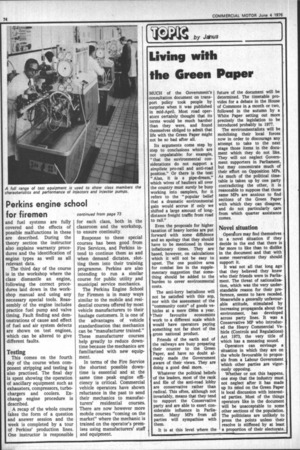Perkins engine school for firemen
Page 76

If you've noticed an error in this article please click here to report it so we can fix it.
and fuel systems are fully covered and the effects of possible malfunctions in these are described. During the theory section the instructor also explains warranty procedures and the identification of engine types as well as all relevant data.
The third day of the course is in the workshop where the class dismantle an engine, following the correct procedures laid down in the workshop manual and using any necessary special tools. Reassembly of the engine includes practice fuel pump and valve timing. Fault finding and demonstrations of cause and effect of fuel and air system defects are shown on test engines, which can be altered to give different faults.
Testing
This comes on the fourth day of the course when component stripping and testing is also practised. The final day is spent showing the operation of ancillary equipment such as exhausters, compressors, turbochargers and coolers. Exchange engine procedure is described.
A recap of the whole course takes the form of a question and answer session and the week is completed by a tour of Perkins' production lines. One instructor is responsible for each class, both in the classroom and the workshop, to ensure continuity.
Response to these special courses has been good from Fire Services, and Perkins intend to continue them as and when demand dictates, slotting them into their training programme. Perkins are also intending to run a similar course for public utility and municipal service mechanics.
The Perkins Engine School for Firemen is in many ways similar to the mobile and residential courses offered by most vehicle manufacturers to their haulage customers. It is one of the advantages of vehicle standardisation that mechanics can be "manufacturer trained." These manufacturer courses help greatly to reduce downtime because the mechanics are familiarised with new equipment.
In terms of the Fire Service the shortest possible downtime is essential and at the same time peak engine efficiency is critical. Commercial vehicle operators have shown reluctance in the past to send their mechanics to manufacturers' residential courses. There are now however more mobile courses "corning on the market" where the mechanic is trained on the operator's premises using manufacturers' staff and equipment.




























































































































